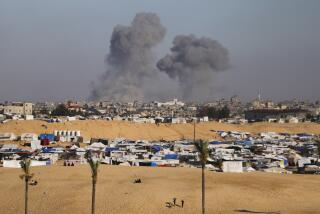Clinton to Urge End of Bosnia Arms Embargo if Serbs Balk : Balkans: U.S. will ask U.N. to lift curbs in October, may supply Muslims, unless peace plan is accepted.
- Share via
WASHINGTON — President Clinton, hoping to head off a confrontation with Congress, said in a letter made public Thursday that he will urge the U.N. Security Council to lift the arms embargo against Bosnia-Herzegovina if Bosnian Serb forces do not agree to a peace plan by mid-October.
In the letter to Sam Nunn (D-Ga.), chairman of the Senate Armed Services Committee, Clinton also indicated that he would end American compliance with the embargo, permitting Washington to send weapons to the Muslim-led government, if the Security Council fails to act “within a reasonable period of time,” presumably sometime in November.
The President’s latest formula for dealing with the bloody ethnic conflict parallels a provision written by House and Senate negotiators into the compromise defense authorization bill.
The provision would prohibit the Pentagon from spending money to enforce the embargo after Nov. 15 if the warring factions have not agreed on a settlement by then.
Although Clinton’s words had the sound of an ultimatum, the President, in effect, gave the rebel Bosnian Serbs two more months to hold out against a peace proposal advanced last month by the United States, Russia, Britain, France and Germany that would give the Serbs 49% of Bosnia’s territory, a substantial rollback from the 70% they now control.
“If by Oct. 15, the Bosnian Serbs have not accepted the proposal, it would be my intention within two weeks to introduce formally and support a resolution in the United Nations Security Council to terminate the arms embargo” on the Bosnian government, Clinton wrote. “Further . . if the Security Council for some reason fails to pass such a resolution within a reasonable period of time, it would be my intention to consult with the Congress thereafter regarding unilateral termination of the arms embargo.”
With Congress firmly on record in favor of ending the embargo, Clinton’s position would seem to leave him with no alternative other than to lift the weapons ban unilaterally if the Bosnian Serbs have not accepted a peace settlement by November.
Administration officials said Clinton is reluctant to take such an action because “there are considerable downsides diplomatically and politically.” The President’s pledge to consult with Congress about the matter sometime in November appears intended to gain a little time and prevent the lawmakers from forcing his hand.
When the five big powers submitted their proposed settlement, they warned of “consequences” if all factions did not accept the plan by July 30. The Muslim-led government and its Bosnian Croat allies accepted but the Bosnian Serbs did not. The five nations postponed a decision on how to punish the recalcitrant party.
On Capitol Hill, Nunn urged advocates of American unilateral action, led by Senate Minority Leader Bob Dole (R-Kan.), to give Clinton’s latest policy a chance to work.
In his letter to the lawmakers, Clinton said the embargo “has unfairly and unintentionally penalized the victim in this conflict.” But he added that action by the United States to unilaterally end the embargo--in effect defying a mandatory resolution of the Security Council--”would have serious implications going well beyond the conflict in Bosnia itself.”
“Our relations with our Western European allies would be seriously strained and the cohesiveness of (the North Atlantic Treaty Organization) threatened,” he wrote. “Our efforts to build a mature and cooperative relationship with Russia would be damaged. It would also greatly increase American responsibility for the outcome of the conflict. The likelihood of greater U.S. military involvement in Bosnia would be increased, not decreased.”
In Sarajevo on Thursday, two U.N. relief planes were hit by gunfire, shutting down the vital airlift of aid to the capital just two days after it had resumed after an 18-day halt, news agencies reported.
Sniper fire increased and convoys of government soldiers were sent to a combat zone north of the city. The incidents indicated that a 7-month-old break in the warfare around Sarajevo may be about to end.
Maj. Dacre Holloway, a U.N. spokesman, said that bullet holes were discovered in the planes after they returned safely to bases in Ancona, Italy, and the Croatian port of Split. No one was injured.
U.N. peacekeepers also said that as many as 3,000 government troops moved to battlefronts just north of Sarajevo on Tuesday and Wednesday, the Associated Press reported. Buses and trucks loaded with more soldiers flowed in Thursday.
The offensive apparently is aimed at breaking the Serbian siege of the city, which has been cut off from the rest of Bosnia for most of the war.
More to Read
Get the L.A. Times Politics newsletter
Deeply reported insights into legislation, politics and policy from Sacramento, Washington and beyond. In your inbox twice per week.
You may occasionally receive promotional content from the Los Angeles Times.










